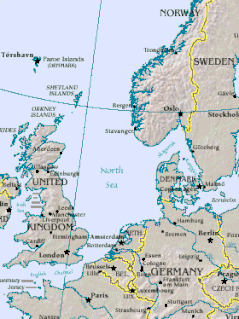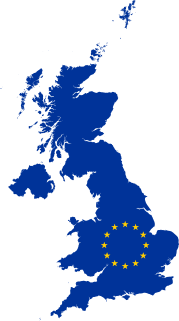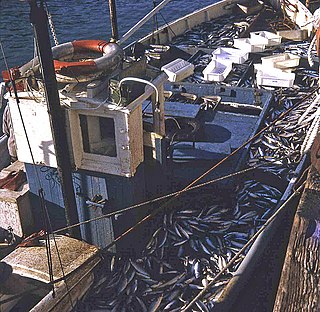
The United Nations Convention on the Law of the Sea (UNCLOS), also called the Law of the Sea Convention or the Law of the Sea Treaty, is an international agreement that establishes a legal framework for all marine and maritime activities. As of June 2016, 167 countries and the European Union are parties.
The Cod Wars were a series of 20th-century confrontations between the United Kingdom and Iceland about fishing rights in the North Atlantic. Each of the disputes ended with an Icelandic victory.

The Common Fisheries Policy (CFP) is the fisheries policy of the European Union (EU). It sets quotas for which member states are allowed to catch each type of fish, as well as encouraging the fishing industry by various market interventions. In 2004 it had a budget of €931 million, approximately 0.75% of the EU budget.

Gibraltar, a British Overseas Territory, located at the southern tip of the Iberian Peninsula, is the subject of an irredentist territorial claim by Spain. It was captured in 1704 during the War of the Spanish Succession (1701–1714). The Spanish Crown formally ceded the territory in perpetuity to the British Crown in 1713, under Article X of the Treaty of Utrecht. Spain later attempted to recapture the territory during the thirteenth siege (1727) and the Great Siege (1779–1783). British sovereignty over Gibraltar was confirmed in later treaties signed in Seville (1729) and the Treaty of Paris (1783).

The Svalbard Treaty recognises the sovereignty of Norway over the Arctic archipelago of Svalbard, at the time called Spitsbergen. The exercise of sovereignty is, however, subject to certain stipulations, and not all Norwegian law applies. The treaty regulates the demilitarisation of the archipelago. The signatories were given equal rights to engage in commercial activities on the islands. As of 2012, Norway and Russia make use of this right.
The Committee on Fisheries (PECH) is a committee of the European Parliament.

The Republic of Ireland–United Kingdom border, sometimes referred to as the Irish border or British–Irish border, runs for 499 km (310 mi) from Lough Foyle in the north-west of Ireland to Carlingford Lough in the north-east, separating the Republic of Ireland from Northern Ireland.

Withdrawal from the European Union is the legal and political process whereby an EU member state ceases to be a member of the Union. Article 50 of the Treaty on European Union (TEU) states that "Any Member State may decide to withdraw from the Union in accordance with its own constitutional requirements".

The fishing industry in Scotland comprises a significant proportion of the United Kingdom fishing industry. A recent inquiry by the Royal Society of Edinburgh found fishing to be of much greater social, economic and cultural importance to Scotland than it is relative to the rest of the UK. Scotland has just 8.4 per cent of the UK population but lands at its ports over 60 per cent of the total catch in the UK.

Fishing in the North Sea is concentrated in the southern part of the coastal waters. The main method of fishing is trawling.

The Good Friday Agreement (GFA), or Belfast Agreement, is a pair of agreements signed on 10 April 1998 that ended most of the violence of The Troubles, a political conflict in Northern Ireland that had prevailed since the late 1960s. It was a major development in the Northern Ireland peace process of the 1990s. It is made up of the Multi-Party Agreement between most of Northern Ireland's political parties, and the British–Irish Agreement between the British and Irish governments. Northern Ireland's present devolved system of government is based on the agreement.

The External relations of the Bailiwick of Jersey are conducted by the External Relations department of the Government of Jersey. Jersey is not an independent state; it is a British Crown dependency, so internationally the United Kingdom is responsible for protecting the island and for consulting Jersey on international trade agreements but it is not a British territory.

The United Kingdom was a member state of the European Union (EU) and of its predecessor the European Communities (EC) – principally the European Economic Community (EEC) from 1 January 1973 until 31 January 2020. Since the foundation of the EEC, the UK had been an important neighbour and then leading member state, until Brexit ended 47 years of membership. During the UK's time as a member state two referendums were held on the issue of its membership, with the first being held on 5 June 1975, resulting in a vote to stay in the EC, and the second, held on 23 June 2016, which resulted in the vote to leave the EU.
The Fisheries privilege is a charter issued by Charles II granting rights to 50 fishermen from Bruges to fish in British coastal waters in perpetuity. It was considered to be a demonstration of gratitude for his exile there from 1656 to 1659. The charter was forgotten for many years but has regained prominence on three occasions. The exact status in law of the agreement remains open to this day.

The impact of Brexit on the Irish border and its adjacent polities involves changes in trade, customs, immigration checks, local economies, services, recognition of qualifications, medical cooperation, and other matters, now that it is the only external EU land border between the United Kingdom and the European Union.

This article outlines the predicted impact of Brexit, the withdrawal of the United Kingdom (UK) from the European Union (EU) and the European Atomic Energy Community.

Trade negotiations between the UK and the EU took place after Brexit between the United Kingdom and the European Union for a trade agreement to make trade easier than it would have been without such a deal. The deal would cover both tariff and non-tariff barriers to trade. The negotiations formally ended on 24 December 2020 with an agreement approved in principle by the UK Prime Minister and the President of the European Commission. The result was the EU–UK Trade and Cooperation Agreement (TCA).

Fish for finance is a possible trade-off that has been considered by both sides in the trade negotiations between the United Kingdom and the European Union (EU) over their future relationship following Brexit in January 2020. The Brexit withdrawal agreement between the two parties called for an agreement on fisheries to be concluded by June 2020, followed by an agreement on financial services at the end of July, deadlines which were both missed. Both were expected to be part of the final EU–UK trade agreement reached by the end of 2020, the end of the Brexit transition period. The final agreement had some broad outlines for a future fishing deal, primarily gradual EU concessions of fishing quota in UK waters, but was largely silent on finance.

The EU–UK Trade and Cooperation Agreement (TCA) is a free trade agreement signed on 30 December 2020, between the European Union (EU), the European Atomic Energy Community (Euratom), and the United Kingdom (UK). It provisionally applied from 1 January 2021, when the Brexit transition period ended, before formally entering into force on 1 May 2021, after the ratification processes on both sides were completed: the UK Parliament ratified on 30 December 2020; the European Parliament and the Council of the European Union ratified in late April 2021.

In 2021, a dispute erupted between French fishermen and the Government of Jersey about the licensing of French fishing boats to fish in Jersey's territorial waters. Jersey is a British Crown Dependency, and despite not being part of the United Kingdom, the licensing of European Union fishing boats to fish in Jersey's territorial waters has changed after the UK exit from the EU. On 6 May 2021, French fishermen held a protest in the waters off Jersey's main harbour. The UK is responsible for the defence of the Channel Islands and sent two patrol boats to Jersey in response to the fishermen's threats to blockade it. French politicians suggested that Jersey's electricity supply fed by undersea cables from France could be cut off in retaliation for Jersey placing limitations on the extent to which French boats can fish in the island's waters.














